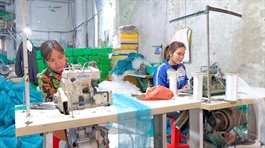All options on the table as livestock firms take on losses
All options on the table as livestock firms take on losses
Livestock businesses in Vietnam are struggling with record low profits after a drop in both prices and demand.

Over the last few weeks, the price of live hogs in Vietnam has fallen, causing livestock groups to suffer losses. In the north, prices have fallen to lower than $2.15 per kg, a two-year low. In the central and southern regions, the price is around $2.20.
The cost of breeding pigs in household farmsteads is about $2.60 per kg, and around $2.15 for big husbandry companies that cover all farming stages from animal feed and seeding to slaughtering. Accordingly, farmers are suffering heavy losses, while big companies like C.P. Vietnam, Japfa Vietnam, CJ, Masan, and Dabaco cannot gain profits.
All options on the table as livestock firms take on losses, photo shutterstock
Towards the end of last year, many pig breeding enterprises reported losses or retreating profits over the same period. According to a February statement, local giant Dabaco saw a loss of more than $3.4 million in the fourth quarter of 2022, while it earned nearly $4.87 million in profit in the same period in 2021. The COVID-19 pandemic, the decline in live hog prices, and the fall in demand have greatly affected business.
Chilled meat giant Masan MeatLife reported a loss of more than $7.4 million in the last quarter of 2022, meaning a loss for the whole of the year of over $10 million. The company has not produced animal feed since the end of 2021, instead paying attention to meat branding.
Nguyen Cong Bac, director of Loc Phat BLLT Livestock JSC in the northern province of Son La, said that he sells 2,000-2,500 pigs every month and at current prices, the company loses as much as $65,000 per month. He said that he has never been in such a difficult situation before, despite working as a pig farmer for over 20 years.
“The barn has been built and we have to pay interest of loans at the bank. If we scale down the sow herd, it is too costly to raise it again later. So despite the low selling price, I still have to maintain the pig herd,” Bac said.
Nguyen Duc Trong, vice chairman of the Vietnam Association of Farms and Agricultural Enterprises, recommended that farmers consider re-herding. “Farmers should strengthen links in a professional livestock chain and ensure biosecurity as well as stable product output,” he said.
Animal feed accounts for up to 70 per cent of input costs. When the selling price of hogs falls, farmers try to cut input costs. So, Trong suggested farmers should actively find domestic sources of animal feed to reduce costs.
According to the Ministry of Agriculture and Rural Development, in 2022, the output of live meat was about 7.05 million tonnes, including 474,300 tonnes of live beef, up 3.5 per cent on-year; 4.4 million tonnes of live hogs, up 5.9 per cent; and two million tonnes of poultry meat, up 4.5 per cent.
In addition, Vietnam spent about $1.5 billion importing meat, meat by-products, and related produce in 2022, up 9.1 per cent on-year.
Nguyen Xuan Duong, chairman of the Animal Husbandry Association of Vietnam, said that both domestic and imported food supplies increased, while the purchasing demand reported a small downtrend due to inflation. Increased consumption of chicken, seafood, and beef led to the sharp dip in the price of pigs.
“Looking at actual consumption, pork prices may continue falling and stay at a low level for the next few months, then gradually increase if purchasing power improves and the economy recovers,” he said.
At last week’s Vietnam Business Forum, the European Chamber of Commerce in Vietnam (EuroCham) highlighted to further utilise the EU-Vietnam Free Trade Agreement to help find new markets to overcome the current breeding woes.
“Vietnam’s government should build clear regulations and standards to apply to both local and export products. At the very least, agricultural products should be traceable and ensure food safety and hygiene to be able to set foot in key markets and generate more value,” EuroCham suggested.






















